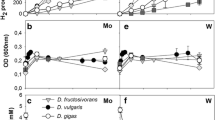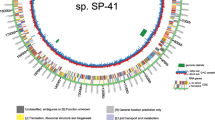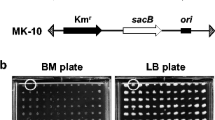Abstract.
The hmc operon of Desulfovibrio vulgaris subsp. vulgaris Hildenborough encodes a transmembrane redox protein complex (the Hmc complex) that has been proposed to catalyze electron transport linking periplasmic hydrogen oxidation to cytoplasmic sulfate reduction. We have replaced a 5-kb DNA fragment containing most of the hmc operon by the cat gene. The resulting chloramphenicol-resistant mutant D. vulgaris H801 grows normally when lactate or pyruvate serve as electron donors for sulfate reduction. Growth with hydrogen as electron donor for sulfate reduction (acetate and CO2 as the carbon source) is impaired. These results confirm the importance of the Hmc complex in electron transport from hydrogen to sulfate. Mutant H801 is also deficient in low-redox-potential niche establishment. On plates, colony development takes 14 days longer than colony development of the wild-type strain, when the cells use hydrogen as the electron donor. This result suggests that, in addition to transmembrane electron transport from hydrogen to sulfate, the redox reactions catalyzed by the Hmc complex are crucial in establishment of the required low-redox-potential niche that allows single cells to grow into colonies.
Similar content being viewed by others
Author information
Authors and Affiliations
Additional information
Electronic Publication
Rights and permissions
About this article
Cite this article
Dolla, A., Pohorelic, B., Voordouw, J. et al. Deletion of the hmc operon of Desulfovibrio vulgaris subsp. vulgaris Hildenborough hampers hydrogen metabolism and low-redox-potential niche establishment. Arch Microbiol 174, 143–151 (2000). https://doi.org/10.1007/s002030000183
Received:
Revised:
Accepted:
Issue Date:
DOI: https://doi.org/10.1007/s002030000183




